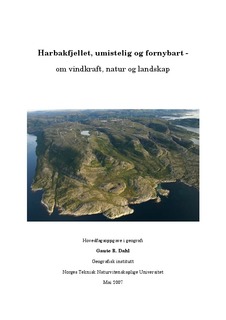| dc.description.abstract | Facing global warming and increasing energy consumption, eyes have fallen on wind power as a renewable source of energy at the turn of the 20.century. The era of hydropower development has been said to come to an end, as nearly all Norwegian lakes, rivers and waterfalls are developed or protected against hydropower industry. Controversy on localization of hydropower has played a crucial role in this history, and is an important backdrop for this thesis.
Entering the planning of a wind-power station with 33 wind turbines on the mountain Harbakfjellet on the west coast of Trøndelag (see figure 1 and 2), the study examines how views on nature and landscape are mobilized and expressed in the formal and informal processes of planning. The combination of dossiers, local and regional newspapers and informal interviews with 10 key informants, are used to show the meanings of nature and landscape, and how they manifest themselves, in the local discourse. As important participants in the local decision process, landowners and planners, politicians and business life representatives share their views and illuminate how personal/individual experiences, as well as collective and shared cultural symbolic history is important for the foundation of knowledge. Stating in this way that knowledge is local, this local case of planning with its negotiation of meaning and struggle for power, shows how people relate differently to nature and landscape and how they make sense of their personal experiences when knowledge about their environment is established.
Borrowing a classification from Milton, (2002) views on nature is examined as ‘personal’ identification or a more or less impersonal or ‘rational’ attitude to the external environment. Further, the thesis, in line with Latour (2004), discusses briefly how the nature-culture dualism in similar ways is reproduced by many human geographers and other spokesmen for the social construction of knowledge, despite their efforts not to. The study is closed by questioning if labeling some local knowledge as alienated by romantic ideology and at the same time celebrating the local knowledge of people who make their living from the land as ‘utilize-romanticist’, themselves suppress and marginalize ‘local heroes’ who ‘dare’ to have a personal view on nature and promote subjective values in their landscape. | nb_NO |
